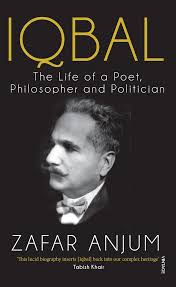Reviewing this biography of Iqbal by Zafar Anjum was a challenging task. For I could not really find any fault with the book. But for most parts, I did not enjoy it either. I picked up the book as I hardly knew anything about Iqbal. I knew him for his famous creation ‘ Saare Jahan Se Achha…’. And the fact that he was one of those who wanted a separate Muslim state that led to the creation of Pakistan. And Pakistan has designated him the national poet of Pakistan. Did I get to know Iqbal more after reading this book – obviously Yes, but am I satisfied – No.
The lineage, the early growing up years, his three marriages and two affairs, a bit about his children sketches him up as a man. A man whose heart and societal norms drove him. A man who went around the world when it was a sheer privilege. And that gave him the edge and advantage over others. He was a poet, a lawyer, a teacher and a politician – all rolled into one. This book gives enough glimpses into the politician and attempts to give some into the poet. It also attempts to decipher the change in Iqbal’s attitude after he spent some time in the west – from being a nationalist poet to that seeking a bigger role for Muslims in India.
But I failed to understand how and where this change happened. The chapters on his stay in UK and Germany focus more on his academic and personal life than his political activity. And not on his association with the people who potentially changed his thought process.
What I liked the most was the quotes at the beginning of each chapter – like ‘ The weak lose themselves in God, the strong discover Him in themselves’ referred from or to as Stray Reflections. There is ample poetry throughout the book with English translation. But mostly lost in translation for me. As the author says you cannot see the poet without his politics – though we would like to. I really wanted to see more of his poetry and how it sprouted from what he saw and what he thought.
I surfed the net to see what other reviewers have to say about him. And lots of them happen to be scholars who have studied Urdu literature. Most of them too found Zafar Anjum’s book lacking the archival research. And I got to understand authors have documented Iqbal well as a poet and thinker. And most of them did not find anything new in the book, Iqbal by Zafar Anjum. Having said that to someone like me who knew nothing about him – there is enough to know about the man.
His work and his role in Indian politics and partition of India. His letters to Jinnah and his insistence on the independent state for Muslims within British India or Independent India bring out the thoughts that eventually led to the creation of Pakistan. I may never read the scholarly works on Iqbal that these reviewers mention, but this book works for a lay reader like me who has a curiosity about Iqbal and not academic interest.
Take your call on this work on Iqbal by Zafar Anjum.
You may buy this book – Iqbal The Life of a Poet, Philosopher and Politician by Zafar Anjum at Amazon.









